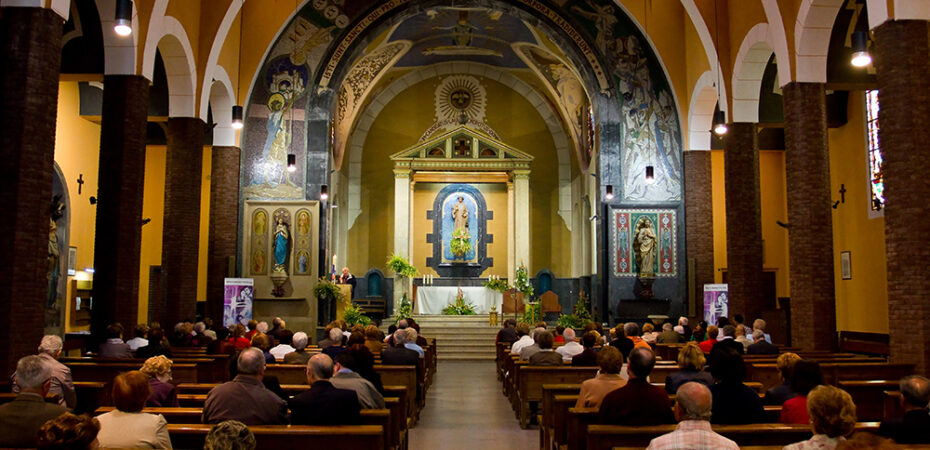Developing Catholic Culture
Something formed and fostered from within to create a healthy parish
Msgr. Michael Heintz Comments Off on Developing Catholic Culture
 We hear often about “Catholic identity”: in our grade schools, high schools, Catholic colleges and universities and even health care institutions. Some institutions may even have a Catholic identity committee, tasked (one imagines) with monitoring and strengthening Catholicism at a given venue. However, I wonder if, in doing so, we are missing the mark.
We hear often about “Catholic identity”: in our grade schools, high schools, Catholic colleges and universities and even health care institutions. Some institutions may even have a Catholic identity committee, tasked (one imagines) with monitoring and strengthening Catholicism at a given venue. However, I wonder if, in doing so, we are missing the mark.
Too often, Catholic identity becomes a matter of external markers: Are there crucifixes in the room? Is Mass offered at least semi-regularly? Is there a priestly presence? And as a result Catholic identity becomes a matter of least-common-denominator thinking — that is, it becomes reducible to the external features of an institution, easily measurable or quantifiable, offering some kind of reassurance that Catholicism is present or alive, at least at a functional level. But this misses the point. All too easily, this becomes a matter of checking boxes, satisfying some standard — real or imagined — by which we affix “Catholic” to an institution.
It strikes me that Catholic identity may be the wrong — or at the very least, a less helpful — category. I would propose “Catholic culture” in its place. Where Catholic identity has become a matter of easily identifiable external features, Catholic culture is more complex, because it is something ultimately formed and fostered from within. Catholic culture emerges as more of an atmosphere or milieu in which people live and think and feel and pray, and when this is in place, Catholic identity is easily seen and, more importantly, robustly witnessed.
After all, any number of Catholic institutions, even those possessing a standing Catholic-identity committee or a full-time Catholic-identity apparatchik, have a weak, thin or pale Catholic culture, even if there may be crucifixes on the wall or the language of “Catholic” is plastered all over its marketing materials.
It is my experience that Catholic identity in many educational and health care institutions is too often reducible to social justice or social doctrine. This is, of course, integral to Catholic life, teaching and identity, but hardly the whole (or even the heart) of it. Too often those elements of Catholic life that are closest to the imagination of contemporary, secular culture are those highlighted as elements of Catholic identity in the hope of appealing to those for whom the robust demands of the full Gospel of Jesus might be off-putting or troublesome.
In short, how many Catholic institutions are happy to jump on board when speaking out about matters of social injustice (and quite rightly so!) but are remarkably quiet when it comes to equally important and timely matters of personal morality, sexual identity, the meaning of marriage and the life and dignity of children in the womb? In short, Catholic identity can be very self-selecting, dodging more controversial matters in favor of those that will ruffle fewer feathers, or which may even “virtue signal” or curry favor with the broader community.
All this is a way of saying that the pastor’s real work is the fostering of a culture in a parish. And because of this, I have become convinced of the value of lengthier priest assignments, particularly for pastors. It is not at all easy (if not impossible) to form a culture in four or six years. But it seems to me that this is the principal task of the pastor and his pastoral team.
This means a vibrant and shared vision of what Catholic life looks like, a deeply lived experience of a community life formed by the idiom and imagination of the Scriptures and centered on the liturgical year and the sacramental life that is the heart of the Catholic faith. It means a parish staff or team who all “buy in” to this common vision and work, and who are also adept at communicating that vision to the parish, so that individuals, couples and families also desire to buy in and begin to live out that vision in their homes and workplaces.
The challenge is that this involves several intangibles that cannot be prepackaged, marketed or quickly transmitted. The pastor and his team plant seeds, and seek to cultivate them; and as those seeds emerge, to nurture and foster them.
There is a basic law of parochial (and diocesan) life: health begets health. Healthy parishes foster healthy disciples who in turn draw others to this life, which is not beholden to anything other than the Gospel of Jesus as both lived out and articulated by his body, the Church.
MSGR. MICHAEL HEINTZ, a priest of the Diocese of Fort Wayne-South Bend, serves as academic dean and director of intellectual formation at Mount St. Mary’s Seminary in Emmitsburg, Maryland.





